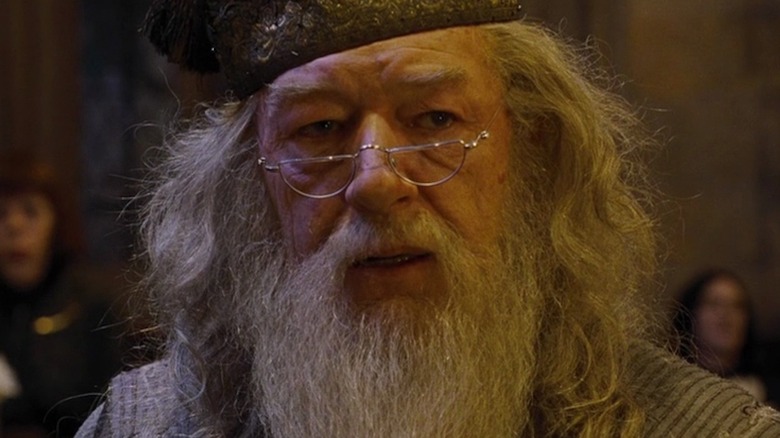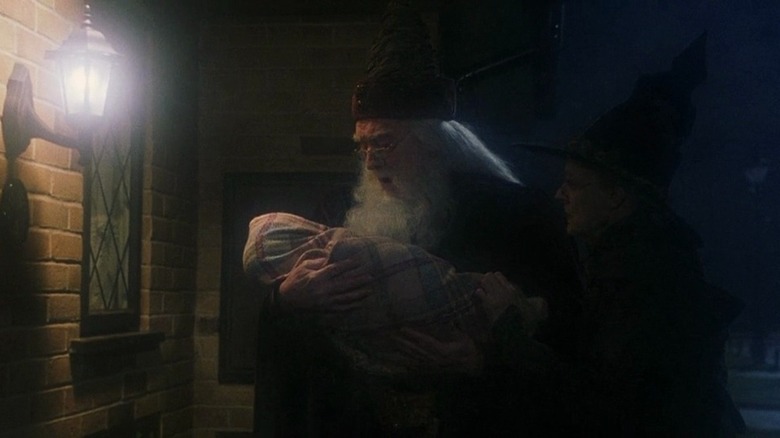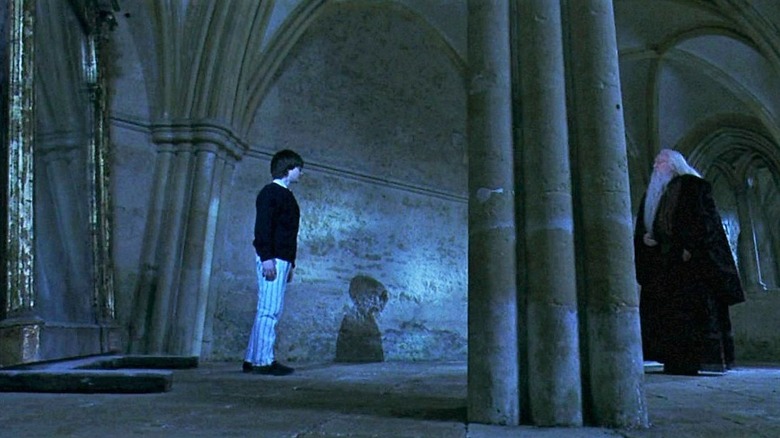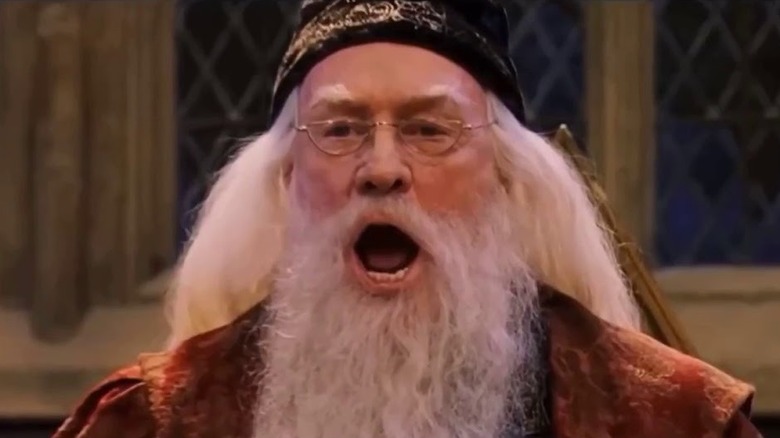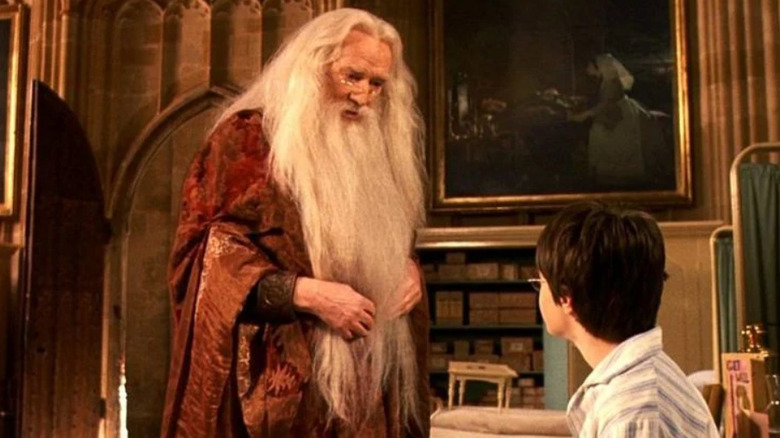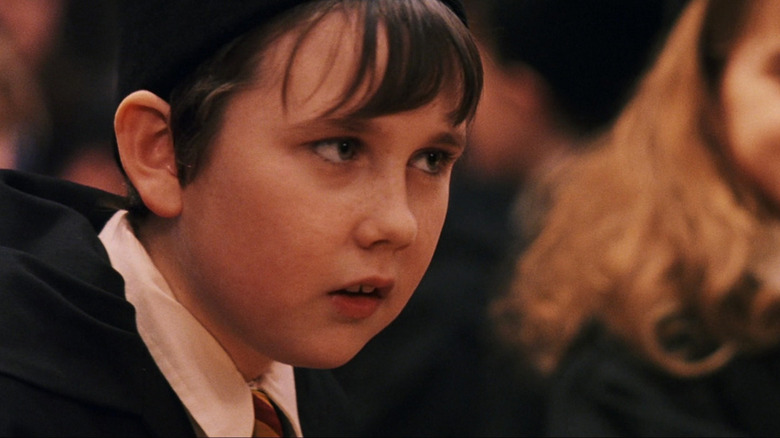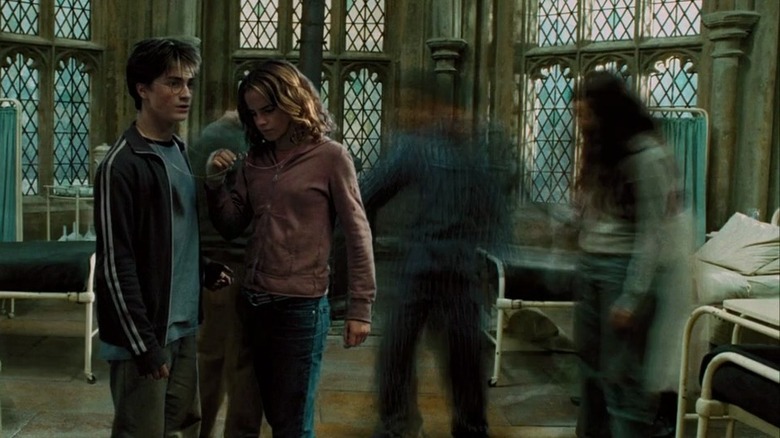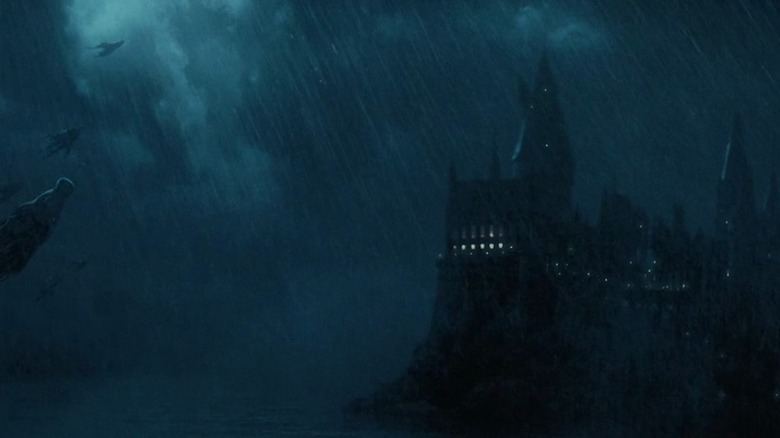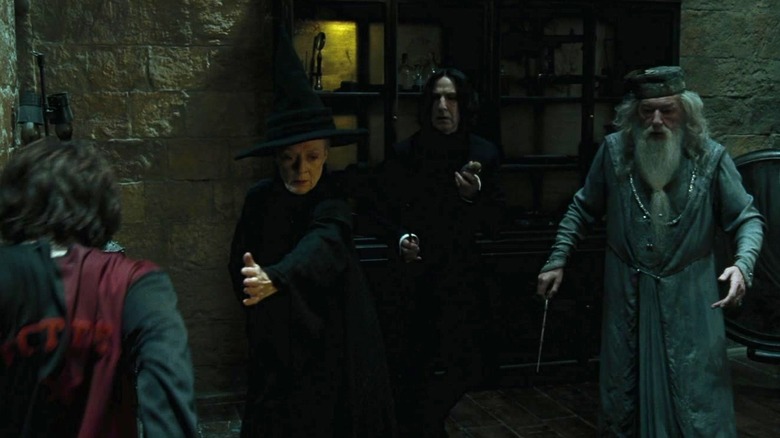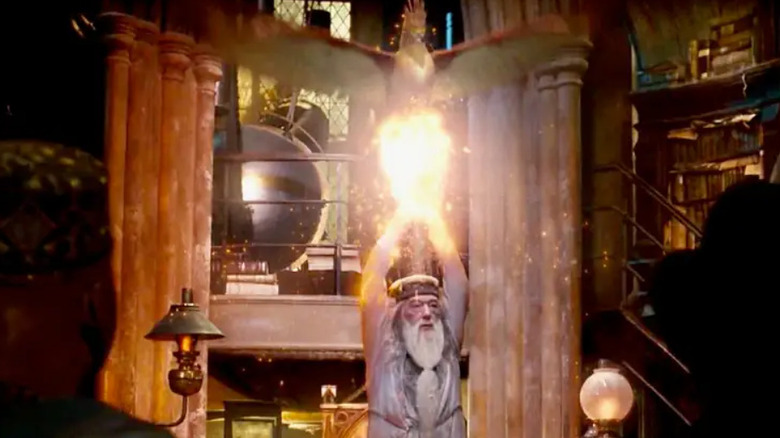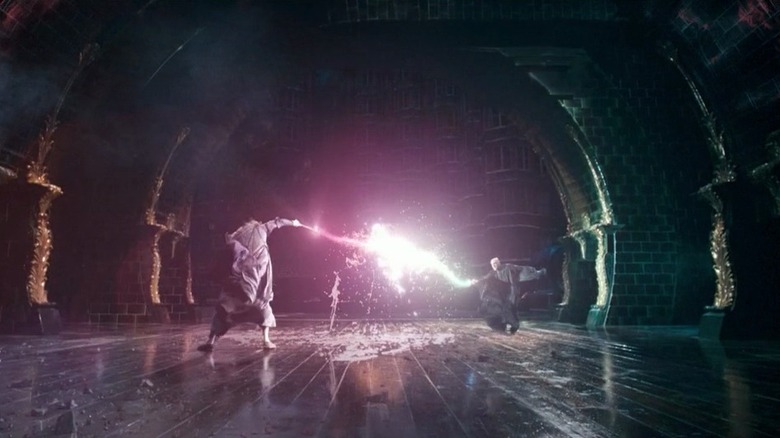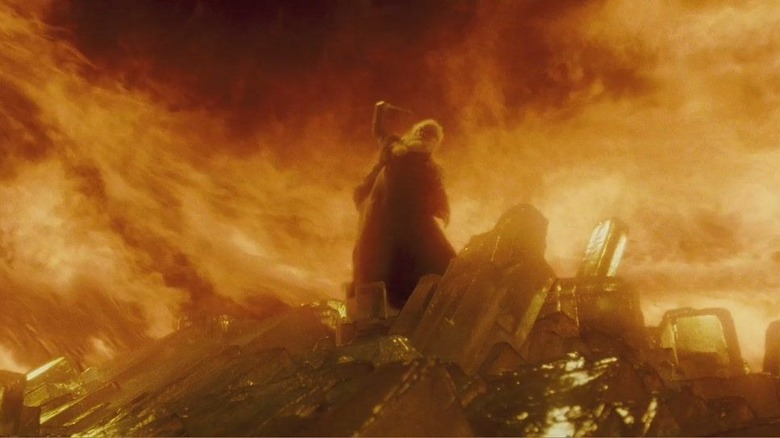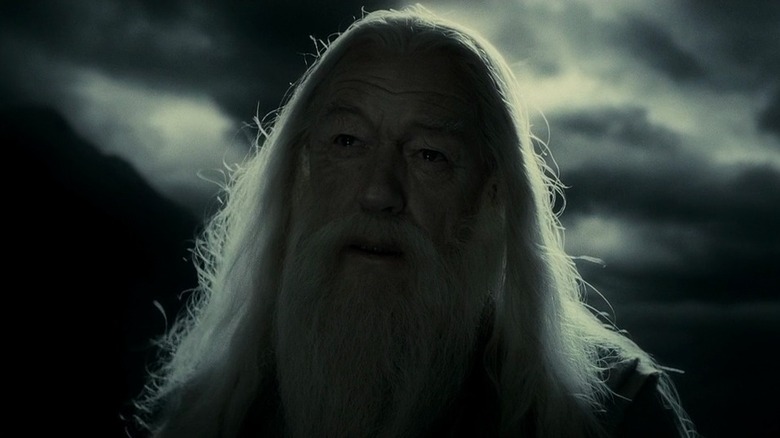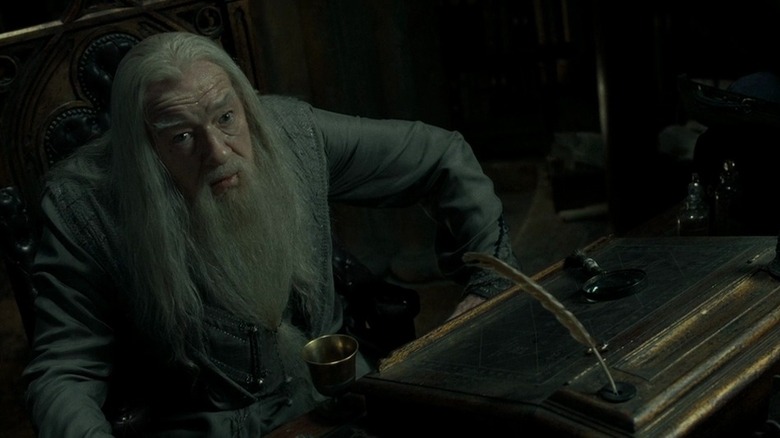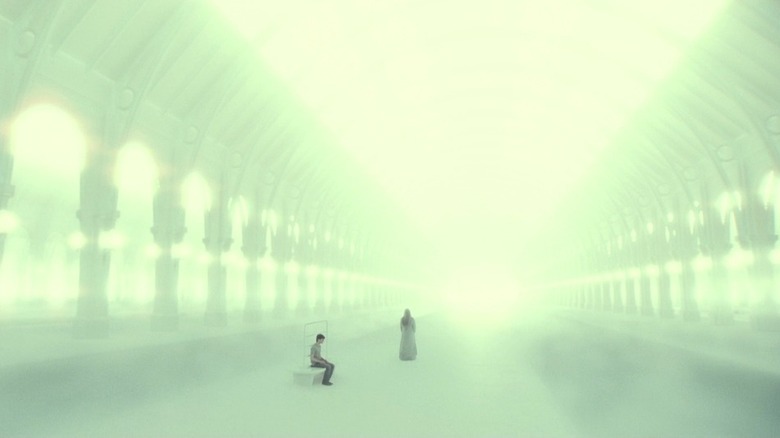The Best Dumbledore Moments From The Harry Potter Movies Ranked
Albus Percival Wulfric Brian Dumbledore was one of the main characters in the "Harry Potter" series of novels written by J.K Rowling. In the grand tradition of Merlin, Gandalf, and Professor X, Dumbledore had vast power at his personal command, but was better known for being a source of guidance and wisdom for the people under his care.
As the headmaster of Hogwarts School of Witchcraft and Wizardry, Dumbledore was involved in the shaping of the minds of adolescent sorcerers. But his main preoccupation was with the threat of the most evil wizard of all time, Lord Voldemort, and the young boy named Harry who was destined to strike the final blow against the villain if he could be trained in the right manner. Naturally, Dumbledore was also a crucial part of the narrative when the seven "Harry Potter" books were adapted into eight films.
Two different actors have played Dumbledore "Harry Potter" so far, with Jude Law portraying the powerful wizard in the "Fantastic Beasts" prequel series. A third actor is on the way, with John Lithgow playing Dumbledore in the upcoming "Harry Potter" HBO series. Before his arrival, let's take a look at the highlights of Dumbledore's time in the "Harry Potter" films that made him a standout character for the franchise.
14. Leaving Harry with the Dursleys
The opening scene of the "Harry Potter" saga is one of the most iconic moments in children's fiction. In "Harry Potter and the Sorcerer's Stone," an ordinary suburban neighborhood in Britain is invaded at night by a strange figure. A tall, elderly man with a flowing beard and even more flowing robes walks up to the main street. He draws an ornately built lighter and proceeds to trap the light coming from the various lampposts in the lighter with a few clicks.
Thus is the world introduced to Professor Albus Dumbledore (Richard Harris). He proceeds to walk down the street, almost absent-mindedly acknowledging a stray cat as his old ally and fellow educator Minerva McGonagall (Maggie Smith) in disguise. Soon they are joined by a huge, hulking man named Rubeus Hagrid (Robbie Coltrane) carrying the most precious cargo, a little infant with a lightning-shaped scar on his forehead asleep in a basket.
Despite his great age, it is immediately made clear that Dumbledore is the leader of the strange trio of adults as they proceed to leave Harry on the doorstep of 4 Privet Drive at the house of the Dursleys. While the audience does not understand who the little child is, it is clear from the gravity of Dumbledore's actions that this is the start of an epic saga. And so it was.
13. Explaining the Mirror of Erised
After the opening scene, Dumbledore took a break from the main events of "Harry Potter and the Sorcerer's Stone" while the audience followed Harry's journey. From growing up in a neglectful environment with the Dursleys to discovering he is a wizard at the age of 11, Harry's life is turned upside down when he is offered the chance to attend Hogwarts.
The first few months at Hogwarts are a whirlwind of excitement as Harry discovers new friends and even a few enemies. But things take a sobering turn when Harry comes across a magical mirror that allows him to see himself standing with his deceased parents, happy and content. The young wizard is so overcome that he begins to spend all his time in front of the mirror.
That is when Dumbledore steps in once again, this time to warn Harry about the dangers of looking too long into the "Mirror of Erised." Even though it is tempting to look forever at your heart's deepest desire that the mirror magically reflects, Dumbledore explains that the image is ultimately only an illusion that fills you with empty longing. It was the first of many instances of Dumbledore reaching out to offer counsel to Harry in his time of need.
12. Taking command during an emergency
While Harry was the happiest he had ever been in his first year at Hogwarts, he was also growing increasingly conscious of the fact that the giant castle he was living in carried many secrets of the sinister variety. More and more, Harry grew convinced that his potions master Professor Snape (Alan Rickman), was plotting to steal a hidden treasure from Hogwarts.
To add to his suspicions, a time came when a giant troll invaded the castle in the middle of a feast.The chilling information reached the main student body and the teachers when timid Professor Quirrell (Ian Hart) came running and screaming into the Great Hall and managed to choke out news of the troll being loose in the castle dungeons and then promptly fainted. Of course, the students started panicking as one. The thunder and lighting outside did not help as the entire student body started to turn into a mob.
That was when Dumbledore rose to his feet at the head of the teacher's table. With a single stern command, the headmaster restored order to the Great Hall. He then calmly instructed the Prefects to shepherd the students back to their dormitories and for the teachers to follow him into the dungeons to take care of the troll. It says much for Dumbledore's sheer presence and reputation as the most powerful wizard in the world that none of the teachers had any hesitation about following him into a confrontation with a giant, angry troll.
11. Discussing Harry Potter's victory over Professor Quirrell
At the end of his first movie, Harry came to the shocking discovery that Snape had been a red herring, and the real servant of Lord Voldemort who had been trying to steal the Philosopher's stone from Hogwarts was Professor Quirrell. Harry managed to stop Quirrell just in time but almost gave up his own life in the struggle.
When the young hero next woke up, he was in the hospital wing of Hogwarts, and walking into the room to check on him was Dumbledore himself. What followed was one of the most heartwarming scenes in the entire franchise. Dumbledore assured Harry that his friends were in good health and gently allayed his fears about Voldemort getting the stone. Most importantly, he revealed that Harry's mother had left a token of her deep and abiding love for her son in his veins which would protect him from the evil touch of the likes of Quirrell and Voldemort.
We also get to see a few instances of Dumbledore's well-known sense of humor as he takes a great deal of interest in the pile of chocolates and goodies Harry's well wishers had left for him near his bed. The headmaster even takes a chance at eating one of "Bertie Bott's Every Flavor Beans" candy, only to comically exclaim, "Alas, earwax!"
10. Giving Neville Longbottom a much-needed win
In the first movie, Harry went from being the Dursleys favorite punching bag to a hotshot athlete and popular student at Hogwarts. Unfortunately, not everyone was lucky enough to follow a similar trajectory. For Neville Longbottom (Matthew Lewis), life at school was difficult due to his naturally timid and clumsy nature.
All through the movie, Neville tried and failed to impress his fellow students or teachers with any sort of special talent or acumen. Still, Neville proved he had the right stuff in him near the end when he single-handedly tried to stop Harry, Ron, and Hermione from breaking curfew and getting their House in trouble again.
All Neville got for his trouble was a stunning spell right in his face by Hermione. But Neville's courage was acknowledged in the end by Dumbledore when he uttered one of his most iconic lines, "It takes a great deal of bravery to stand up to your enemies, but a great deal more to stand up to your friends." With that, Dumbledore awarded Neville ten points which won Gryffindor the house cup that year, and for the first time, gave Neville's classmates a reason to cheer for the overwhelmed little boy.
9. Plotting to save Sirius Black
It is a popular joke that has more than a bit of truth to it that nothing happens at Hogwarts without Dumbledore's knowledge. At the end of "Harry Potter and the Prisoner of Azkaban," Harry discovers that his would-be murderer Sirius Black (Gary Oldman), had been framed and that Black is actually devoted to Harry's well-being.
Unfortunately, the joy of discovering he had a Godfather who actually cared for him was cut short when Sirius was imprisoned at Hogwarts by the Ministry of Magic and about to be fed to the dementors. Harry and Hermione had little time to explain Sirius's innocence to the adults. But naturally, Dumbledore (Michael Gambon) already knew all about it.
The headmaster then proceeded to lay out a plan for Harry and Hermione that would allow them to save Sirius' life in the nick of time. The plan worked just as Dumbledore had envisioned, and once again, the ancient wizard proved that he did not even need to pull out his wand in order to make miracles happen.
8. Turning away the Dementors
Fans have often noted that "Harry Potter and the Prisoner of Azkaban" was the movie where the franchise started to move away from its kid-friendly roots into darker territory. The symbol of this change was the dementors, first introduced in the film as wraithlike creatures who feed off the happiness of people, leaving only despair in their wake.
Harry proved particularly susceptible to the dementors since he had endured so much trauma in his life. The problem came into stark focus during a Quidditch match, when the dementors left their position guarding the entrances of Hogwarts and entered the grounds. Riding on his broomstick high in the air, Harry was suddenly surrounded by the ghoulish creatures, and he fell to the ground in a dead faint. The last image before Harry's seemingly inevitable demise was Dumbledore rising up from the audience stands.
With one gesture, the headmaster slowed Harry's breakneck descent and brought him safely to the ground. It was later revealed that after saving Harry, Dumbledore single-handedly turned away the army of Dementors from the grounds back to their posts. Learning about such feats of power was when audiences first began to truly appreciate the truth of the legend that had been repeated since the first movie, that Harry's kindly old headmaster was, in fact, the only wizard in the world that Lord Voldemort himself had feared to cross.
7. Stopping the fake Mad-Eye Moody
"Harry Potter and the Goblet of Fire" was when things really got kicked into high gear. Harry was faced with the prospect of competing in the "Triwizard Tournament" despite being woefully underqualified. To top it all, the movie ended with Harry being used to resurrect Lord Voldemort (Ralph Fiennes) into an even more powerful form.
After a long year of secrets and double crosses, it was finally revealed that Barty Crouch Jr. (David Tennant) posing as Alastor Moody (Brendan Gleeson) had been secretly guiding Harry into the path of Lord Voldemort. Just as Moody/Crouch is about to kill Harry, the door to his room is flung open and Dumbledore enters, taking Moody out with a single curse and saving Harry.
Dumbledore's entrance is epic enough, but it is even better when you read how J.K. Rowling described the headmaster's arrival in the book. "The look upon Dumbledore's face as he stared down at the unconscious form of Mad-Eye Moody was more terrible than Harry could have ever imagined," Rowling wrote. "There was no benign smile upon Dumbledore's face, no twinkle in the eyes behind the spectacles. There was cold fury in every line of the ancient face; a sense of power radiated from Dumbledore as though he were giving off burning heat."
6. Escaping his own office
The next movie, "Harry Potter and the Order of the Phoenix," saw Dumbledore actively avoiding Harry for fear that Voldemort would try to get to the headmaster through Harry by using their secret mind connection. While Dumbledore's reasoning was sound, his unexplained behavior made Harry feel angry and slightly betrayed.
Trying to take matters into his own hands to fight Voldemort, Harry took to training other Hogwarts students in a secret club called "Dumbledore's Army." Unfortunately, the army came under the radar of the Ministry of Magic, which was looking for any reason to discredit both Harry and Dumbledore, particularly the Minister for Magic himself, Cornelius Fudge (Robert Hardy).
When Harry's activities had him facing expulsion, Dumbledore took full responsibility for the creation of the "Army" under his name. Fudge was delighted to use the incident as an excuse to send the headmaster to prison. But all it took was touching his pet phoenix for Dumbledore to escape from his office right under the nose of Fudge and his men. This led to the iconic line, "You may not like him, Minister. But you can't deny, Dumbledore's got style."
5. Facing down Voldemort
Just as Harry's reputation as "The Boy Who Lived" always preceded him in the wizarding world, so did Dumbledore's reputation for being the only person in the world whom Voldemort was too afraid to take on personally. For the longest time, it was difficult for audiences to believe the always-smiling and jokey headmaster of Hogwarts could be an even more powerful wizard than "He Who Must Not Be Named."
All that changed with "Harry Potter and the Order of the Phoenix." At the end of the movie, Harry and his friends are in a desperate race to escape Voldemort's Death Eaters. Just when it seems Harry will be able to lead his friends to safety, Voldemort himself arrives, preparing to strike down anyone in his path. And then, just as all hope seemed lost, Dumbledore himself arrived to save the day.
The two powerful wizards squared off against each other for an epic battle. Dumbledore showed no slight hint of fear as he deflected Voldemort's most powerful spells and conjured up magical traps that even the Dark Lord struggled to get out of. Finally, Voldemort realized this was a battle he could not hope to win, and he resorted to possessing Harry to keep Dumbledore at bay, a ploy that ultimately did not succeed.
4. Burning the undead
In "Harry Potter and the Prisoner of Azkaban," viewers only heard it being mentioned that Dumbledore single-handedly turned away an army of dementors from the school grounds back to their posts. But in "Harry Potter and the Half-Blood Prince," we actually get to see how Dumbledore would face down a whole lot of evil magical creatures.
Near the end of the movie, Dumbledore takes Harry to the secret cave where Voldemort had hidden a piece of his soul inside a cursed locket. To get to the locket, Harry was forced to feed Dumbledore a poisoned liquid that sapped the old man's strength and left him whimpering and crying on the ground. It was shocking to see the great wizard in such a state. Harry desperately tried to help by getting water to give to his headmaster from a nearby lake. That was when an army of undead called the "Inferi" started swarming out of the lake.
One Inferius grabbed Harry and dragged him to the bottom of the lake. In his last moments before drowning, Harry saw a fiery blaze light up the top of the lake. A single shaft of the fire snaked down to destroy the Inferius holding on to Harry. When he finally managed to swim up out of the lake, Harry was awed to see the greatly weakened Dumbledore holding the entire army of Inferi at bay with a storm of magical fire.
3. Severus, please
After getting the locket from the cave, Harry returned with the still-weakened Dumbledore to Hogwarts. There they discovered that Draco Malfoy (Tom Felton) had managed to smuggle a bunch of Death Eaters into the castle to wreak havoc. Harry and Dumbledore were trapped at the top of a tall tower as Draco prepared to fulfill his promise to Voldemort by killing his headmaster.
Even in that position, Dumbledore showed no hint of fear. Instead, he offered Draco the chance to come over to the side of good and save his soul. As Harry prepared to strike at Draco from his hiding place, Severus Snape sneaked up behind him and gestured to Harry to keep quiet while Snape took care of business.
After revealing himself to Draco and the other Death Eaters, it seemed for a moment that Snape was going to save the day. But then Dumbledore said quietly, "Severus... please." And Snape shot the headmaster down with the killing curse. It later transpired that the whole thing had been a preformulated plan between Snape and Dumbledore to spare Draco of the need to carry out his killing. Right up until his final moments, Dumbledore remained in complete control of his fate.
2. The Grand Plan
With the start of "Harry Potter and the Deathly Hallows — Part 1," Harry began to realize that Dumbledore was a far more complicated figure than he had imagined. The former headmaster had once dreamed of ruling over all of muggle-kind alongside Gellert Grindelwald.
But even that revelation paled in comparison to what Harry discovered inside Snape's memories after the latter's passing. Harry watched Snape and Dumbledore plotting and planning over the years, always with the goal of keeping Harry alive and making him stronger. But in the end, Dumbledore revealed all of this was done so Harry could play his part in ending Voldemort's reign once and for all by offering himself up willingly to be killed by the Dark Lord.
So complete were Dumbledore's plans, and so shrewd his understanding of Harry, that even after finding out that Dumbledore had been raising him "like a pig for slaughter," as Snape put it, Harry still felt he had no choice but to follow the path laid out for him by Dumbledore from beyond the grave. And so The Boy Who Lived walked willingly into the Forbidden Forest to offer himself up as a sacrifice to Voldemort — all according to the plan Dumbledore had set in motion years ago when he left Harry at the Dursleys doorstep. Talk about playing the long game.
1. Saving Harry and defeating Voldemort
By the end of "Harry Potter and the Deathly Hallows — Part 2," fans had found out so many shocking revelations about Dumbledore and his secrets that they were getting emotional whiplash. But even after Harry had willingly allowed Voldemort to kill him in accordance with Dumbledore's plan, the former headmaster revealed he had one final trick up his sleeve.
After getting struck by the killing curse, Harry wakes up in a dream-like location that looks like King's Cross Station. There he meets some version of Dumbledore, who informs him that Harry's willingness to sacrifice his life for his friends had allowed the part of Voldemort's soul attached to him to be killed off, leaving Harry's soul whole and intact.
And so, at long last, the full extent of Dumbledore's master plan was revealed, which was to kill off Voldemort for good — while also managing to save Harry. With that revelation, Dumbledore took his leave of Harry one final time, proving that the headmaster had indeed cared deeply for his young charge all these years.
